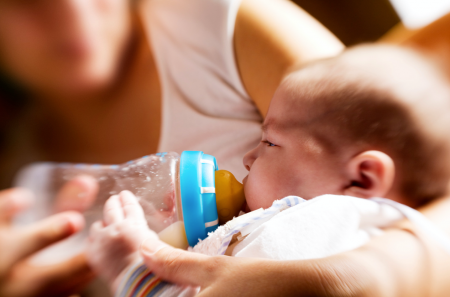Health with Humanity

By Joanna Burke-Bajaj

August is Breastfeeding Awareness Month, and as such it is also a time when new parents can sometimes find themselves thrust into a social media spotlight and their personal choices on whether or not to breastfeed their infant can feel as though they are on public display, with sometimes judgemental and shame-filled results. There is still a significant amount of guilt held by those who cannot or choose not to breastfeed their child, and much of the public’s deeply held beliefs in the perils of not breastfeeding come from limited data perpetuated by ‘Breast is Best’ campaigns, in which, “the risks associated with a failure to breastfeed are drastically overstated,” (Colen & Ramey 2014). Breast is Best is a campaign of breastfeeding essentialism supported by the WHO and UNICEF, which has in turn cascaded into guidelines and debates in the medical community. The response to the Breast is Best campaign by advocates for safe alternatives to breastfeeding is known as ‘Fed is Best’, noting that despite the fact there are some health benefits from breastfeeding, a well-nourished baby is the key result that parents and physicians should be looking for, regardless of their method.
At its core, the breastfeeding debate is about freedom of choice, the pressures and shame placed on new mothers, and the need for infants to be fed for their health. The Fed is Best concept does not negate that there are benefits to breastfeeding, including the passage of immune system antibodies from mother to infant. Instead, the Fed is Best idea focuses on the fact that feeding an infant by formula is a safe and nutritional equivalent to breastfeeding. Fed is Best also does not imply that that those who choose to breastfeed, are able to breastfeed, and find mental health and enjoyment from breastfeeding, should stop doing so. In fact it’s quite the opposite: the movement is merely supporting empowering parents to trust their instincts and preferences to know what is best for them and their baby – to feed breastmilk if and when they want, and to feed their baby through alternative means when that is the right decision for them. Many breastfeeding parents support the mission of Fed is Best, and in fact many breastfeeding parents transition to “mixed” feeding or using formula to supplement breastfeeding practices.
“Efforts to increase breastfeeding that solely focus on individually based behavior change without addressing the economic and social realities women face and the difficult tradeoffs they are forced to make in the months following the birth of their child, risk alienating and stigmatizing the very women they hope to help.”
– Colen & Ramey 2014
In the wake of this monumental push to essentialize breastfeeding both socially and medically, parents who use any alternative to breastfeeding feel immense shame and stigma, as if they have committed a terrible act against the health of their child. The truth is, there are many reasons why parents may not be able to exclusively breastfeed their baby, even when they very much wish that they could do so, and in these instances ensuring that the infant has an alternative nutrition is the best decision that a parent could make for their child.
New mothers attempting to breastfeed are can be overwhelmed, exhausted, and feel anxiety over needing to be the sole feeder of their child, especially if they are not able to take a lengthy paid maternity leave, and these factors affecting parental mental health are very important. Pumping breastmilk can help allow for the mother’s partner to engage in feeding times as well, but consistent pumping can be difficult or even sometimes impossible to do. In this way, use of formula can ensure that the child is meeting regular feeding times and gaining nutrition while feeding from both parents, without the pressure of constant feeding being placed only on the mother. Additional reasons for needing to use an alternative to breastfeeding include cases of babies with dietary allergies being unavoidably passed allergens through breastmilk, and some mothers have a low natural milk supply that leaves them physically unable to produce enough milk as the baby requires which can actually result in brain damage if the insufficient supply is not recognised (Wilson 2017). For others, they find there is simply no way to get their baby to latch in a reliable way for feedings.
It is within these cases where it becomes clear that today’s parents are fortunate to have safe and effective alternatives to breastfeeding that allow infants to be fed the necessary level of nutrition they need continuing growing into healthy children. No parent should ever feel ashamed of the way their baby is fed, and all parents should have the right to choose the way that they nourish their baby without needing to justify their choice, as long as the child is maintaining health by all medical indicators set out through their physician. The main goal of choosing a feeding plan for a baby should be nourishing the infant in the way that works best for them and the parents, and ultimately produces a healthy child with physically and mentally healthy parents as well.
As members of the public, health advocates, and public health practitioners, the best thing we can do for new parents is to support them in making informed choices that are best for both themselves and their babies, without fearing an aftermath of shame.
Like what you read?
More on Joanna Burke-Bajaj here.
References
Colen C., & Ramey D. (2014). Is breast truly best? Estimating the effects of breastfeeding on long-term child health and wellbeing in the United States using sibling comparisons. Social science & medicine (1982), 109, 55–65. https://doi.org/10.1016/j.socscimed.2014.01.027
Oster E. (2019). Is breast really best? I looked at all the data to find out. The Guardian. Accessed online at https://www.theguardian.com/lifeandstyle/2019/jun/20/is-breast-really-best-i-looked-at-all-the-data-to-find-out .
Wilson C. (2017). Are there downsides to ‘breast is best’? BBC Future, In Depth Medicine. Accessed online at https://www.bbc.com/future/article/20170503-are-there-downsides-to-breast-is-best

